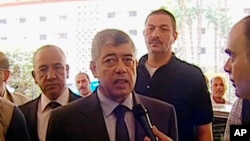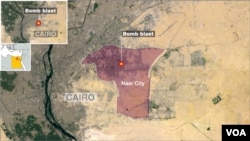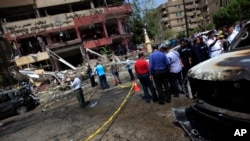CAIRO —
A bomb exploded near a convoy carrying Egyptian Interior Minister Mohamed Ibrahim Wednesday in Cairo, an attack authorities are calling an assassination attempt. Several people were wounded but officials say the minister was unhurt.
Ibrahim was leaving his home in Cairo's Nasr City neighborhood when the blast struck near his convoy. Authorities initially pointed to a car bomb, but later said they suspected an explosive was thrown from a nearby building.
State media described the attack as a failed assassination attempt, though there is no word on who is responsible.
Senior Muslim Brotherhood leader Amr Darrag condemned the assassination attempt on Ibrahim.
"The bombing allegedly targeting the minister of interior today is regrettable and the alliance strongly condemns it,'' Darrag said in a statement on behalf of the "Anti-Coup Alliance'', led by the Muslim Brotherhood.
Resident Raouf Mahmoud, who lives close to the minister, said he was parking his car when he heard a "massive explosion."
"People were running randomly. And just after that there were two cars or three cars, black BMW's from the security guard cars, they were on fire," he said. "Just after that, like three or four minutes, gunshots."
Ibrahim was leaving his home in Cairo's Nasr City neighborhood when the blast struck near his convoy. Authorities initially pointed to a car bomb, but later said they suspected an explosive was thrown from a nearby building.
State media described the attack as a failed assassination attempt, though there is no word on who is responsible.
Senior Muslim Brotherhood leader Amr Darrag condemned the assassination attempt on Ibrahim.
"The bombing allegedly targeting the minister of interior today is regrettable and the alliance strongly condemns it,'' Darrag said in a statement on behalf of the "Anti-Coup Alliance'', led by the Muslim Brotherhood.
Resident Raouf Mahmoud, who lives close to the minister, said he was parking his car when he heard a "massive explosion."
"People were running randomly. And just after that there were two cars or three cars, black BMW's from the security guard cars, they were on fire," he said. "Just after that, like three or four minutes, gunshots."
Situation now, Mostafa El Nahas 11:25 AM. #Bey2ollak pic.twitter.com/ZQiTIW0cIt
— ♆ Raouf Mahmoud ♆ (@RaoufMahmoud) September 5, 2013
There were no immediate claims of responsibility for the blast.
Matafy waslt mostafa el na7as. #Bey2ollak @Rezo007 pic.twitter.com/O1kPoUS4Tf
— ♆ Raouf Mahmoud ♆ (@RaoufMahmoud) September 5, 2013
Cairo and much of Egypt has been on a high security alert since a crackdown on opponents of the new military-led government.
Some 1000 people, mainly supporters of ousted Islamist president Mohamed Morsi, were killed August 14 and in the days that followed. The biggest confrontation was at Rabaa al-Adawiya, not far from the site of Thursday's blast.
Some 1000 people, mainly supporters of ousted Islamist president Mohamed Morsi, were killed August 14 and in the days that followed. The biggest confrontation was at Rabaa al-Adawiya, not far from the site of Thursday's blast.
Mostafa El Nahas now..20 minutes after explosion. #Bey2ollak @Rezo007 pic.twitter.com/7G3zBHo8YI
— ♆ Raouf Mahmoud ♆ (@RaoufMahmoud) September 5, 2013
A government-imposed state of emergency and a nighttime curfew remain in effect and many Egyptians have hailed what the government calls a war on terrorism.
Much of the top leadership of Morsi's Muslim Brotherhood has been detained, with some, including the former president, accused of inciting violence. Others are in hiding or have left the country.
Morsi's supporters counter it is the government that has committed violence and accuse the military of carrying out a coup.
Some analysts have warned of a return to the dominant narrative of pre-2011 revolution politics: a military-led government versus an Islamist, sometimes violent, opposition.
Al-Masry al-Youm publisher and democracy advocate Hisham Kassem says the situation risks a renewed wave of terrorism, but that it will not succeed.
"There can be some bloodshed. There can be some sad situations. But they do not have the ability to enforce a political position or reality through the resort to violence," he said.
But individuals who spoke on background out of concern over reprisals caution that in the current atmosphere, responsibility for such acts might not always be clear, and warn of staged events to further justify the government crackdown.
Much of the top leadership of Morsi's Muslim Brotherhood has been detained, with some, including the former president, accused of inciting violence. Others are in hiding or have left the country.
Morsi's supporters counter it is the government that has committed violence and accuse the military of carrying out a coup.
Some analysts have warned of a return to the dominant narrative of pre-2011 revolution politics: a military-led government versus an Islamist, sometimes violent, opposition.
Al-Masry al-Youm publisher and democracy advocate Hisham Kassem says the situation risks a renewed wave of terrorism, but that it will not succeed.
"There can be some bloodshed. There can be some sad situations. But they do not have the ability to enforce a political position or reality through the resort to violence," he said.
But individuals who spoke on background out of concern over reprisals caution that in the current atmosphere, responsibility for such acts might not always be clear, and warn of staged events to further justify the government crackdown.






